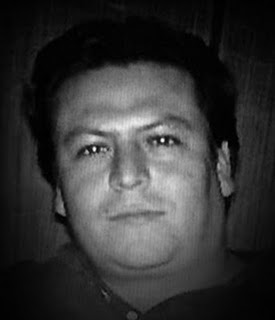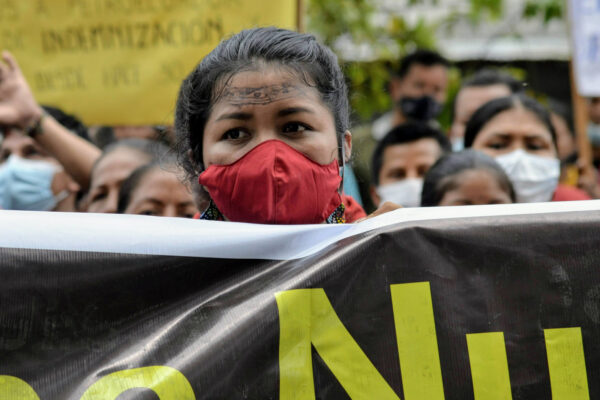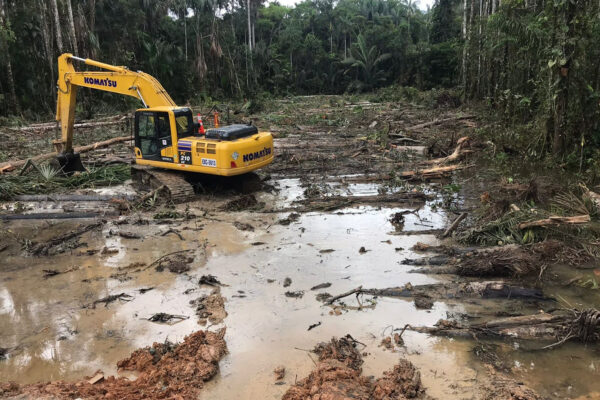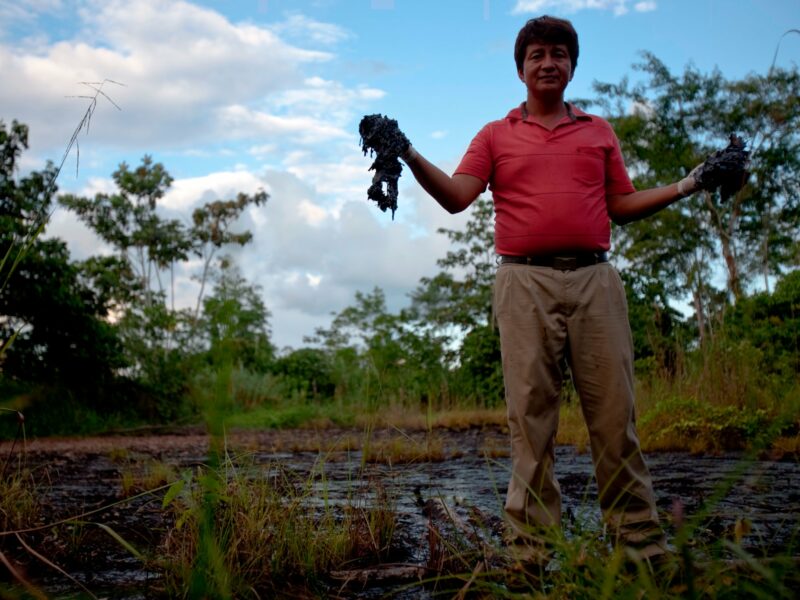A former oil operations assistant for Texaco (now Chevron) in Ecuador explains how oil workers were told to dump toxic waste directly into the rainforest. Chevron’s dumping of 18 billion gallons of toxic waste water created an ongoing environmental catastrophe for tens of thousands of local residents, who continue to suffer an epidemic of cancer and other oil-related illnesses to this day.
Multinational corporations like Chevron are experts at maintaining a veneer of gentility and levelheaded reason. They have to be, of course; when you wreak as much havoc as Chevron does on lives, communities and ecosystems around the world, the only way not to invite universal public disgust and condemnation is to make sure the people who are your public face aren’t ever the ones doing your dirty work.
Of course, there’s plenty of dirty work to be done, especially when those you’ve wronged fight back and start to get too close for comfort to your billions of dollars in annual profit. Like when you’ve been sued by Ecuadorian communities for decades of devastation of the Amazon rainforest, and after 18 years a judge just sided with those communities and ordered you to pay $9 billion in damages. But that’s what Chevron has its hired guns for.
The hired guns we already know all about are the ones in the U.S. at big time law firms like Gibson Dunn, the architects of Chevron’s recent outrageous attempt to sue everyone ever associated with the Ecuadorian lawsuit against it for extortion and racketeering, under a law written to prosecute the mafia. Chevron’s strategy is to use its overwhelming legal and financial resources to dig up and air every bit of plaintiffs’ dirty laundry (much of it exaggerated and taken out of context). Chevron has used legal discovery motions known as 1782 actions to subpoena hundreds of hours of outtakes from the documentary film Crude, and enough personal documents from attorney Steven Donziger that it’s a wonder they haven’t demanded his weekly grocery lists yet. The company seems confident that its own skeletons will remain safely hidden in the closet – that the other side doesn’t have the overwhelming financial resources to launch the same kind of multi-pronged courtroom assault back at it.

Now, however, we may see even Chevron’s most unflappable lawyers and PR flacks start to break a sweat as the curtain is pulled back just a little on Chevron’s own skullduggery in Ecuador. On Friday, the plaintiffs won a 1782 discovery motion of their own, using Chevron’s best weapon against it for the first time. Federal judge Edward Chen of the Northern District of California has ordered the deposition of the company’s former Ecuadorian “dirty tricks” operative Diego Borja.
Borja first made headlines in 2009 in a supposed bribery scandal involving videotapes of the then-judge in the Ecuadorian pollution case. Upon closer examination it turned out that not only was there no evidence the judge, Juan Nuñez, had ever accepted a bribe or engaged in unethical behavior, but the motivations of Borja himself, whom Chevron initially claimed was a “good Samaritan” who had approached the company with evidence of wrongdoing, proved considerably more hazy. Borja and his wife had both formerly worked as Chevron contractors, and Borja had met with the oil company’s lawyers before the final taped meeting with Judge Nuñez, strongly suggesting a plot to frame Nuñez and force his recusal from the case, delaying the verdict that finally arrived last week. Most damning, tapes surfaced in which Borja had privately told a friend that he had incriminating evidence he could use to blackmail Chevron if they did not pay him enough for his vital assistance. Borja has claimed he helped Chevron launder oil contamination samples in Ecuador, by creating and controlling supposedly independent laboratories.
As it turns out, Chevron was more than happy to pay Borja to keep him quiet. They relocated him to a $6,000-a-month home near the company’s California headquarters, and hired him a well-known criminal defense lawyer. Despite Borja and Chevron’s repeated efforts to prevent Borja from having to testify in court, Judge Chen has now ordered his deposition, and it seems more and more likely that Chevron will not come out looking like the scrupulous, above-board adherent to ethical practices and sober scientific analysis that it has so painstakingly sought to appear. Hopefully its veneer of i-dotting and t-crossing will crumble, as it should have by now in the face of what is abundantly clear to the eyes (and nose!) of anyone who visits its former well sites and waste pits in Ecuador: Chevron is guilty of a colossal environmental crime, and no number of man-hours spent digging into the private communications of those who dare hold it to account can change that fact.













